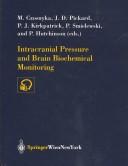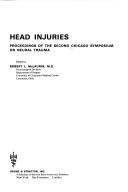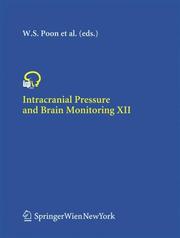| Listing 1 - 10 of 22 | << page >> |
Sort by
|
Dissertation
Year: 2001 Publisher: Liège : Université de Liège. Faculté de médecine (ULg). Département de clinique et pathologie médicales,
Abstract | Keywords | Export | Availability | Bookmark
 Loading...
Loading...Choose an application
- Reference Manager
- EndNote
- RefWorks (Direct export to RefWorks)
Book
ISBN: 1107171253 1280850434 9786610850433 0511278608 0511279205 0511277431 0511321538 0511544995 0511278020 Year: 2007 Publisher: Cambridge : Cambridge University Press,
Abstract | Keywords | Export | Availability | Bookmark
 Loading...
Loading...Choose an application
- Reference Manager
- EndNote
- RefWorks (Direct export to RefWorks)
The condition known most widely as pseudotumor cerebri syndrome is of diagnostic interest and clinical importance not just to neurosurgeons, but also to neurologists, ophthalmologists and headache specialists. Variously called idiopathic intracranial hypertension, benign intracranial hypertension, and other names over the century or so since it was first recognised, the authors argue for the grouping of all these conditions under the name of pseudotumor cerebri syndrome on the basis of a common underlying mechanism - an impairment of CSF absorption due to abnormalities at the CSF/venous interface. The book reviews the development of ideas around some of the more contentious issues and deals in depth with aetiology, investigative findings and strategies, treatment and outcome, and in the concluding chapter, considers the possibility of establishing an experimental model to facilitate analysis of the unresolved issues, and pointing the way to a more complete understanding of this controversial condition.
Dissertation
ISBN: 9064643687 Year: 2004
Abstract | Keywords | Export | Availability | Bookmark
 Loading...
Loading...Choose an application
- Reference Manager
- EndNote
- RefWorks (Direct export to RefWorks)
Cochlear Aqueduct --- Intracranial Pressure --- Ear, Inner --- physiology --- Theses
Book
Year: 1978 Publisher: Philadelphia (Pa.) Saunders
Abstract | Keywords | Export | Availability | Bookmark
 Loading...
Loading...Choose an application
- Reference Manager
- EndNote
- RefWorks (Direct export to RefWorks)
Brain Neoplasms --- Child --- Intracranial Pressure --- Nervous System Diseases --- complications
Dissertation
ISBN: 9052780447 Year: 1992 Publisher: Maastricht Universitaire pers
Abstract | Keywords | Export | Availability | Bookmark
 Loading...
Loading...Choose an application
- Reference Manager
- EndNote
- RefWorks (Direct export to RefWorks)
Aging --- Arginine Vasopressin --- Intracranial Pressure --- Vasopressins --- Radioimmunoassay --- blood

ISBN: 3211837760 Year: 2002 Publisher: Wien : Springer,
Abstract | Keywords | Export | Availability | Bookmark
 Loading...
Loading...Choose an application
- Reference Manager
- EndNote
- RefWorks (Direct export to RefWorks)
Brain Injuries --- Brain damage --- Cerebrovascular Circulation --- Cerebrovascular disease --- Hemodynamic monitoring --- Hydrocephalus --- Intracranial Pressure --- Intracranial pressure --- Monitoring, Physiologic --- Physiopathology --- Physiology --- Measurement

ISBN: 080890938X Year: 1976 Publisher: New York (N.Y.): Grune and Stratton
Abstract | Keywords | Export | Availability | Bookmark
 Loading...
Loading...Choose an application
- Reference Manager
- EndNote
- RefWorks (Direct export to RefWorks)
Brain --- Head --- Intracranial pressure --- Prognosis --- Craniocerebral Trauma --- Wounds and injuries --- Congresses
Dissertation
Year: 1984 Publisher: 's-Gravenhage Jongbloed
Abstract | Keywords | Export | Availability | Bookmark
 Loading...
Loading...Choose an application
- Reference Manager
- EndNote
- RefWorks (Direct export to RefWorks)
Hypertension --- Hypotension --- Blood Volume --- Cerebrovascular Circulation --- Intracranial Pressure --- Pulse --- cerebrospinal fluid
Book

ISBN: 9780813579337 0813579333 9780813579320 0813579325 9780813579313 0813579317 Year: 2016 Publisher: New Brunswick, NJ : Rutgers University Press,
Abstract | Keywords | Export | Availability | Bookmark
 Loading...
Loading...Choose an application
- Reference Manager
- EndNote
- RefWorks (Direct export to RefWorks)
When the brain suffers an injury, the effects can be delayed and unpredictable. Cerebrospinal fluid can slowly build up, causing dangerously high levels of intracranial pressure (ICP), and the brain tissue can be displaced into adjacent compartments, resulting in cerebral herniation syndrome (CHS). Within the burgeoning field of neurocritical care, experts are just beginning to understand the nuanced, sometimes counterintuitive relationship between ICP and CHS. Written by leading researchers who also have extensive first-hand clinical experience treating brain injury patients, Cerebral Herniation Syndromes and Intracranial Hypertension provides an up-to-date guide to this complex aspect of neurocritical care. Drawing from expertise gained working in high-volume medical centers, the book's contributors reveal that there is no universal metric for gauging acceptable levels of intracranial pressure. Instead, they demonstrate the best practices for offering patients individualized care, based on their specific conditions and manifest symptoms. Bringing together internationally-renowned neurocritical care experts from a variety of neurology, critical care, surgery, and neurosurgery disciplines, this volume takes a comprehensive look at a complicated issue. A concise, practical, and timely review, Cerebral Herniation Syndromes and Intracranial Hypertension offers vital information for all medical personnel concerned with improving neurocritical patient care.
Encephalocele --- Intracranial hypertension. --- Benign intracranial hypertension --- Hypertension, Intracranial --- Otitic hydrocephalus --- Pseudotumor cerebri --- Serous meningitis --- Hypertension --- Intracranial pressure --- Cerebral hernia --- Brain --- Neural tube --- Skull --- Treatment. --- Hernia --- Abnormalities

ISBN: 1280610255 9786610610259 321132318X 3211243364 3211998780 Year: 2005 Publisher: Wien ; New York : Springer,
Abstract | Keywords | Export | Availability | Bookmark
 Loading...
Loading...Choose an application
- Reference Manager
- EndNote
- RefWorks (Direct export to RefWorks)
88 short papers originating from the 12th International Symposium on Intracranial Pressure and Brain Monitoring held in August 2004 in Hong Kong present experimental as well as clinical research data on invasive and non-invasive intracranial pressure and brain biochemistry monitoring. The papers have undergone a peer-reviewing and are organized in nine sections: ICP management in head injury, neurochemical monitoring, intracranial hypertension, neuroimaging, hydrocephalus, clinical trails, experimental studies, brain compliance and biophysics.
Hydrocephalus --- Intracranial pressure --- Cerebrovascular disease --- Measurement --- Hydrocephaly --- Water on the brain --- Brain --- Pressure, Intracranial --- Cerebrospinal fluid pressure --- Diseases --- Neurosurgery. --- Critical care medicine. --- Neurosciences. --- Neurology. --- Anesthesiology. --- Intensive / Critical Care Medicine. --- Anaesthesiology --- Surgery --- Nerves --- Neurosurgery --- Medicine --- Nervous system --- Neuropsychiatry --- Neural sciences --- Neurological sciences --- Neuroscience --- Medical sciences --- Intensive care --- Intensive medicine --- Emergency medicine --- Intensive care units --- Neurology . --- Intensive Care Medicine. --- Neuroscience. --- Surgery.
| Listing 1 - 10 of 22 | << page >> |
Sort by
|

 Search
Search Feedback
Feedback About UniCat
About UniCat  Help
Help News
News